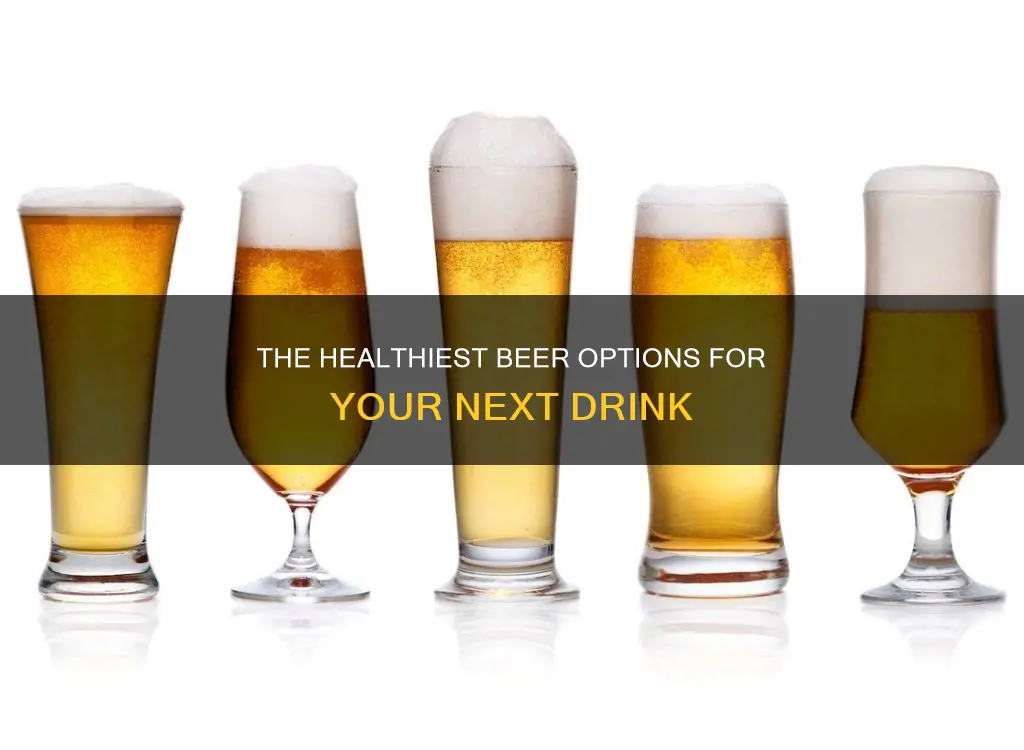
Beer is no superfood, but drinking it in moderation can be part of a healthy lifestyle. While excessive alcohol consumption can be harmful to your health, light to moderate consumption of beers can help prevent type-2 diabetes, osteoporosis, coronary heart disease, hypertension, dementia, and some types of cancer. Beer also contains antioxidants, minerals, and vitamins, including several essential nutrients easily digestible in beer form.
Characteristics of the Healthiest Beer
| Characteristics | Values |
|---|---|
| Alcohol Content | No or low alcohol |
| Carbohydrates | Less than 10 grams |
| Calories | Less than 100 |
| Antioxidants | High |
| Phenols | High |
| Hops | High |
| Type | Light beers, stouts, porters, IPAs, ales |
What You'll Learn

Lower alcohol content
While beer is not exactly a superfood, drinking it in moderation can be part of a healthy lifestyle. According to a registered dietitian, the lower the alcohol content in a beer, the better. This is to help reduce the negative health impacts associated with alcohol consumption. Beers with less than 5% alcohol by volume (ABV) are ideal.
Non-alcoholic beers, which are defined as containing less than 0.5% ABV, are a good option for those looking to avoid the negative health consequences of alcohol. These beers still provide the taste of beer without the inebriating effects.
In addition to lower alcohol content, choosing lighter beers can also be a healthier option. Regular beer can be high in carbohydrates, which can lead to unregulated blood sugars and spiking. Lighter beers tend to have fewer calories and less alcohol, making them a smarter choice when drinking in moderation.
When it comes to specific beer recommendations, Corona Premier, Lagunitas DayTime IPA, and Michelob Ultra Pure Gold are all lower in alcohol content and calories. Miller64 is another solid choice, with a crisp and refreshing taste and only 2.8% ABV. Budweiser Select 55 is also worth considering, with just 2.4% ABV and 55 calories per 12 fluid ounces.
Ultimately, the key to drinking beer healthily is moderation. By choosing beers with lower alcohol content and being mindful of consumption, individuals can enjoy the taste of beer while minimising potential negative health impacts.
Guinness Beer: Healthy Choice or Just a Myth?
You may want to see also

Fewer calories
While beer is not exactly a superfood, drinking it in moderation can be part of a healthy lifestyle. If you're looking to cut down on calories, here are some beers to consider:
Beck's Premier Light
Beck's Premier Light is a refreshing, low-calorie option, containing just 64 calories per bottle. However, with an ABV of only 2.3%, it may not be the best choice if you're looking for a stronger drink.
Bud Light
Bud Light has been a popular choice for modern beer drinkers since its introduction in 1982. With 110 calories per bottle and an ABV of 4.2%, it offers a good balance of flavour and lower calories.
Corona Premier
Corona Premier is one of the lightest beers from the Corona brand, with 90 calories and an ABV of 4%. It's a traditional Mexican lager-style beer, using barley malt, unmalted cereals, hops, and bottom-fermenting yeast, making it a refreshing choice for those watching their calorie intake.
Heineken Light
Heineken Light is a smooth yet slightly bitter beer, similar to some white wines. With only 99 calories and an ABV of 3.3%, it's a good option if you're looking for a lighter beer that still has some flavour.
Miller Lite
Miller Lite is an American favourite, known for its refreshing taste and light-to-medium body. With 96 calories and an ABV of 4.2%, it's a good choice for those looking for a low-calorie option without compromising on flavour.
Michelob Ultra
Michelob Ultra is a crisp and fresh beer with no artificial colours or additives. At 95 calories per bottle and an ABV of 4.2%, it's a good choice if you're looking for a light beer that still packs a bit of a punch.
Guinness Draught
Guinness Draught is a nitrogen-infused stout that looks and tastes rich and creamy but is surprisingly light. With 126 calories per bottle and an ABV that varies by market (typically around 4% to 5%), it's a good option for those seeking a flavourful yet relatively low-calorie beer.
In addition to these well-known brands, there are also several craft beers and low-calorie IPAs available, such as Lagunitas DayTime IPA and Dogfish Head Slightly Mighty IPA, which offer a more distinctive flavour profile while still keeping the calorie count low.
Drinking Beer in Moderation: How Much Is Too Much?
You may want to see also

Less sugar
While beer is no superfood, drinking it in moderation can be part of a healthy lifestyle. The key to choosing a healthier beer is to look for those with lower alcohol content and fewer calories and carbohydrates.
Beers with lower alcohol content are generally healthier. "Beer can have various alcohol contents ranging from 4 to 7% alcohol by volume (ABV), but less than 5% is ideal," says registered dietitian Amy Davis.
Light beers are a good option, as they tend to have fewer calories and less alcohol than regular beers. For example, Budweiser Select 55 has just 55 calories and 1.9 grams of carbohydrates per 12-ounce serving. Miller64 is another light option with only 64 calories and 2.4 grams of carbs per serving.
Some beers may also be flavoured and include added sugars, which can push the carb count up to over 25 grams per serving. However, if you're looking for a more robust flavour, darker beers brewed with berries, oranges, or cranberries may offer some health benefits in the form of free-radical fighting antioxidants.
When it comes to IPAs, Dogfish Head Slightly Mighty Lo-Cal IPA is a good choice. It's made with monk fruit instead of refined cane sugar and has just 95 calories and 3.6 grams of carbs per 12-ounce serving.
If you're a fan of stouts, Guinness Draught is a relatively healthy option. It has less than 10 grams of carbs and is known for its thick and creamy texture.
For a gluten-free option, Ghostfish Shrouded Summit Belgian White Ale is a good choice. It's safe for those with gluten sensitivity and celiac disease and has 125 calories and 8 grams of carbs per 12-ounce serving.
In general, choosing a beer with around 100 calories or less and around 10 grams of carbs or less is a good rule of thumb for selecting healthier options.
The Pros and Cons of IPA Beer Consumption
You may want to see also

Dark beers
Research has shown that moderate beer consumption may reduce LDL oxidation, a process that causes inflammation in the arteries. By preventing these blockages, you lower your chances of heart attack and disease. Dark beers also have the highest levels of phenolics, which are important for fighting free radicals.
One of the healthiest dark beers is Guinness Extra Stout, which is packed with antioxidants and phenols that can help your body fight free radicals. It also contains folate, which has been linked to boosting sperm count and healthy erections.
Another option is Hoegaarden Original White Ale, a Belgian beer that is double-fermented, meaning it contains a small amount of gut-supporting live yeast. This can be beneficial for your digestive system.
Beer vs Rum: Which Alcoholic Beverage is Healthier?
You may want to see also

Light beers
When it comes to light beers, there are plenty of options that deliver on taste without derailing your diet. Typically, light beers are characterised by lower alcohol and calorie content, with fewer carbohydrates.
One of the lightest lagers on the market is Budweiser Select 55, which contains only 55 calories, less than 2 carbs, and 2.4% ABV per 12-ounce serving. Another low-calorie option is Miller64, with 64 calories, 2.4 grams of carbs, and 2.8% ABV per 12-ounce serving. These beers are great choices if you're aiming to limit your calorie intake without sacrificing the occasional drink.
If you're looking for a light beer with a bit more flavour, Michelob Ultra is a popular choice. With 95 calories, 2.6 grams of carbohydrates, and an ABV of 4.2%, it's definitely one of the healthier options. For a similar calorie count but higher ABV, there's Amstel Light, a Dutch import with 95 calories, 5 grams of carbs, and 3.5% ABV.
For those who prefer their beer with a bit more body, Yuengling Light Lager strikes a balance between health and flavour. With 99 calories, 8.5 grams of carbs, and 3.2% ABV, it's a solid choice for a healthier full-bodied lager. Similarly, Coors Light offers a refreshing option with 102 calories, 5 grams of carbs, and an ABV of 4.2%.
When it comes to light beers, it's important to remember that "light" usually indicates lower calorie content. These beers tend to have reduced alcohol and carbohydrate levels, making them a better fit for a healthy diet. However, it's always important to drink in moderation and be mindful of your overall consumption, as even "healthy" beers can contribute to excess calories if overindulged.
Bitter Beers: Health Benefits or Just a Fad?
You may want to see also
Frequently asked questions
Some of the healthiest beers include Beck's Premier Light, Corona Premier, Crooked Stave Sour Rosé, Dogfish Head Slightly Mighty Lo-Cal IPA, and Guinness Draught.
When choosing a healthy beer, it is important to consider the alcohol content, calorie count, and carbohydrate levels. Lower alcohol content, fewer calories, and fewer carbohydrates are generally considered healthier.
Lighter beers, such as lagers and IPAs, tend to have fewer calories and a lower alcohol content, making them a healthier option. Stouts and porters, on the other hand, have higher antioxidant activity but also tend to have more calories and alcohol.
Moderate beer consumption may have some health benefits, such as reducing the risk of heart disease, hypertension, and certain types of cancer. Beer also contains antioxidants, minerals, vitamins, and phenols, which can have anti-inflammatory properties.







